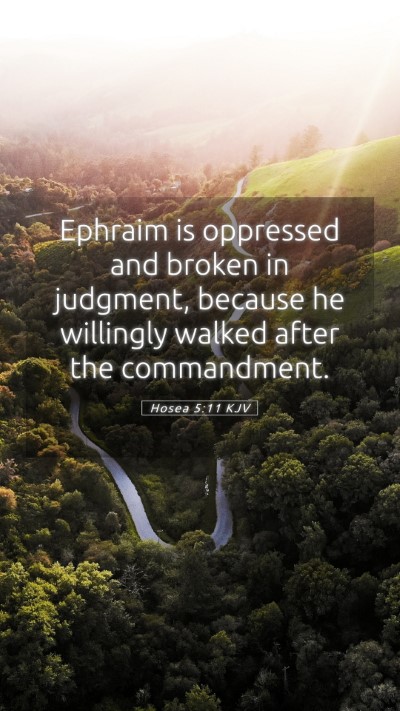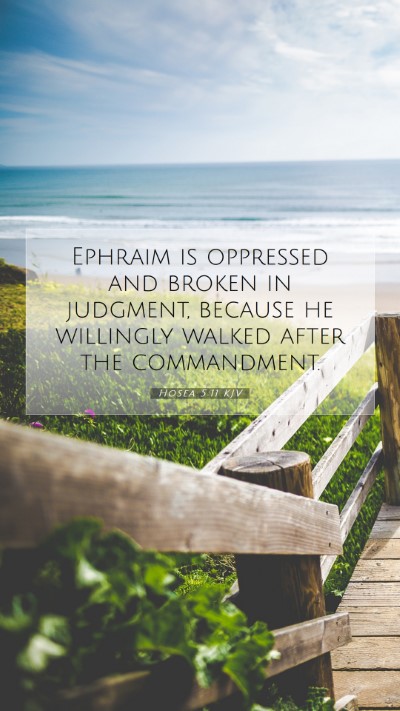Old Testament
Genesis Exodus Leviticus Numbers Deuteronomy Joshua Judges Ruth 1 Samuel 2 Samuel 1 Kings 2 Kings 1 Chronicles 2 Chronicles Ezra Nehemiah Esther Job Psalms Proverbs Ecclesiastes Song of Solomon Isaiah Jeremiah Lamentations Ezekiel Daniel Hosea Joel Amos Obadiah Jonah Micah Nahum Habakkuk Zephaniah Haggai Zechariah MalachiHosea 5:11 Meaning
What is the meaning of Hosea 5:11?
Ephraim is oppressed and broken in judgment, because he willingly walked after the commandment.
Hosea 5:11 Bible Verse Meaning
Bible Verse Commentary: Hosea 5:11
Bible Verse: Hosea 5:11 - "Ephraim is oppressed and broken in judgment, because he willingly walked after the commandment."
Interpretation and Understanding
This verse captures the plight of Ephraim, representing the Northern Kingdom of Israel, in the face of divine judgment. The use of the term "oppressed" indicates the severe consequences that arise from Ephraim's disobedience to God's commandments.
Meanings and Explanations:
- Oppression: The term signifies not just physical suffering but also moral and spiritual decline. Ephraim's choice to walk according to man-made commandments instead of divine instructions has led to their downfall. This reflects a broader principle of divine justice — that behaviors aligning with God’s word lead to blessings, while rejection invites consequences.
- Broken in Judgment: This phrase implies that Ephraim is figuratively "shattered" due to its rebellion. Such judgment is not arbitrary; it is a direct result of choices made against God’s will. This supports the understanding that righteousness brings protection, while sin leads to vulnerability.
- Willingly Walking: The phrase indicates a profound lack of awareness or care in one's choices. The people of Ephraim are actively participating in their downfall, showcasing a rejection of divine wisdom. This serves as a warning that intentional sin can lead to dire consequences.
Insights from Commentaries
Matthew Henry: Henry notes that the character of Ephraim showcases the larger human tendency to stray from God despite having had previous knowledge of His ways. Their "brokenness" serves as a reminder of the foundational truth of Scripture — that obedience to God leads to life.
Albert Barnes: Barnes emphasizes the action of willingly walking in sin, which shows premeditated rebellion. He suggests that such actions are met with severe divine repercussions. The backsliding of Ephraim highlights a theological principle — the law of sowing and reaping, applicable even in modern interpretations of Scripture.
Adam Clarke: Clarke discusses the implications of judgment on both the individual and community levels. He asserts that when individuals collectively succumb to sin, the entire society suffers. Clarke encourages readers to seek moral rectitude to avoid falling into the same traps as Ephraim.
Application for Today
For contemporary readers, Hosea 5:11 serves as a poignant reminder to examine personal conduct and societal values in light of God’s commandments. The verse prompts introspection about what one prioritizes in daily life and encourages adherence to biblical principles as a safeguard against moral decay.
Cross References
- Hosea 4:6: "My people are destroyed for lack of knowledge." - This verse provides insight into the consequences of ignorance of God's laws.
- Jeremiah 2:19: "Your wickedness will punish you; your backslidings will rebuke you." - This reinforces the theme of divine retribution for disobedience.
- Proverbs 14:34: "Righteousness exalts a nation, but sin is a reproach to any people." - A reminder that actions have communal repercussions.
Conclusion
Through a thorough study of Hosea 5:11, we uncover essential truths about disobedience, judgment, and the faithfulness of God's word. Biblical exegesis illuminates the significance of this passage, making it relevant for personal reflection and communal consideration. Engaging with such scriptures allows for deeper Bible verse understanding and spiritual growth.


